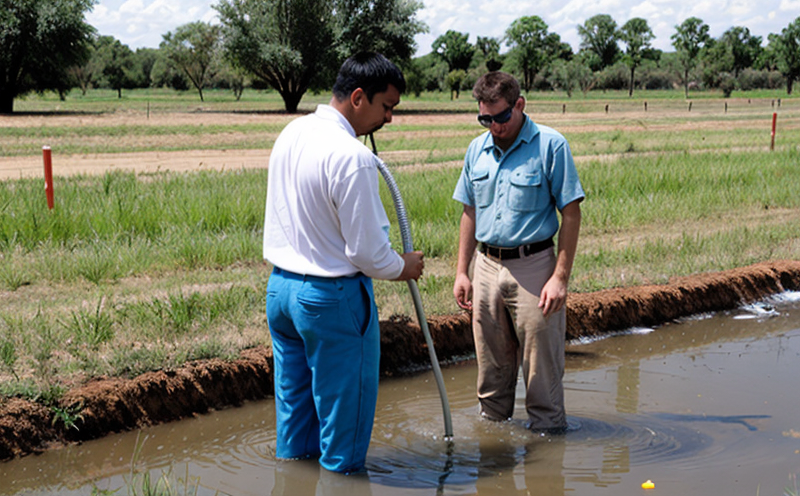EPA 200.8 Metals by ICP MS Test in Groundwater
The Environmental Protection Agency (EPA) Method 200.8 is a well-established protocol for the determination of metals in drinking water and groundwaters. This method utilizes Inductively Coupled Plasma Mass Spectrometry (ICP-MS) to analyze samples, providing high sensitivity and precision necessary for accurate metal quantification.
This testing service is particularly valuable for ensuring compliance with regulatory standards such as those set by the EPA and local state agencies. Groundwater supplies are essential resources that can be contaminated by various pollutants including heavy metals from industrial activities, agricultural runoff, or natural sources. Monitoring these contaminants helps protect public health and environmental quality.
The ICP-MS technique employed in this testing method offers several advantages over traditional analytical methods like atomic absorption spectroscopy (AAS). It allows for simultaneous detection of multiple elements within a single sample run, reducing analysis time significantly while maintaining high accuracy levels. The use of this advanced technology ensures reliable results capable of detecting even trace amounts of metals that may pose health risks.
For the EPA 200.8 Metals by ICP-MS Test in Groundwater, samples are typically collected from wells or boreholes according to specified procedures outlined in the method document. Preparatory steps include filtering particulate matter through appropriate filters followed by dilution if necessary before being introduced into the ICP-MS instrument for analysis.
The equipment utilized for this service includes state-of-the-art ICP-MS instruments capable of handling complex matrix samples common in environmental testing applications. These systems feature robust software packages designed to automate sample introduction, acquisition of spectra data, and subsequent interpretation against established reference materials.
Results generated from the EPA 200.8 Metals by ICP-MS Test are reported according to standard formats prescribed by regulatory bodies like the EPA or local authorities. This includes detailed information about detected metals along with their concentrations expressed in parts per billion (ppb) or micrograms per liter (Ω/L).
By adhering strictly to the procedures specified in EPA Method 200.8, our laboratory ensures consistent and reproducible results across all samples processed. This consistency is crucial when monitoring changes over time or comparing data between different locations.
The importance of this testing cannot be overstated given its role in safeguarding human health and environmental integrity by identifying potentially harmful metal contaminants early on. Regular monitoring helps maintain compliance with applicable regulations while also providing valuable insights into the effectiveness of remediation efforts undertaken at contaminated sites.
In conclusion, the EPA 200.8 Metals by ICP-MS Test in Groundwater is an indispensable tool for ensuring safe and clean groundwater supplies. By leveraging cutting-edge technology and rigorous procedural protocols, our laboratory provides accurate and reliable results that contribute significantly to environmental protection initiatives.
Scope and Methodology
| Sample Type | Preparation Steps | Analytical Instrumentation | Data Interpretation |
|---|---|---|---|
| Groundwater Samples | Filtering and Dilution if Necessary | Inductively Coupled Plasma Mass Spectrometer (ICP-MS) | Comparison Against Reference Materials |
The EPA 200.8 Metals by ICP-MS Test involves several key stages to ensure accurate and reliable results:
- Sample Collection: Groundwater samples are collected from specified depths using certified sampling equipment.
- Preparation: Collected water samples undergo filtration through 0.45 micron filters to remove particulate matter. Dilution may be required based on initial measurements.
- Analytical Procedure: Filtered and diluted samples are introduced into the ICP-MS instrument for analysis. The system generates mass spectra which provide quantitative data regarding metal concentrations present in the sample.
- Data Interpretation: Analyzed spectral data is compared against certified reference materials to determine final concentrations of metals detected.
This comprehensive approach guarantees that all samples are evaluated consistently and accurately, ensuring compliance with regulatory requirements.
Benefits
The EPA 200.8 Metals by ICP-MS Test in Groundwater offers numerous advantages for organizations involved in environmental monitoring or remediation projects:
- Regulatory Compliance: Ensures adherence to strict EPA standards, enhancing legal standing.
- Precision and Accuracy: High sensitivity provided by ICP-MS allows detection of trace amounts of metals not possible with other methods.
- Rapid Turnaround Times: Automating sample preparation and analysis processes speeds up overall testing time.
- Credibility: Results obtained from this test are widely accepted within the scientific community, increasing trust among stakeholders.
- Versatility: Suitable for both routine monitoring and investigative studies focusing on specific contaminants.
- Cost Efficiency: By identifying issues early through regular testing, significant costs associated with cleanup or replacement of contaminated resources can be avoided.
In summary, the benefits extend beyond mere compliance; they encompass improved operational efficiency, enhanced credibility, and better decision-making capabilities for those involved in managing environmental resources responsibly.
Quality and Reliability Assurance
To maintain the highest standards of quality and reliability, our laboratory employs stringent quality control measures throughout every stage of the EPA 200.8 Metals by ICP-MS Test process:
- Instrument Calibration: All instruments are regularly calibrated against national traceability standards to ensure accuracy.
- Reference Material Use: Certified reference materials are used for calibration and quality assurance checks during testing.
- Data Validation: Each set of data is cross-verified using multiple analytical techniques where applicable.
- Audits and Inspections: Regular internal audits conducted by qualified personnel ensure compliance with established procedures.
- Certifications: Our laboratory holds relevant certifications from recognized bodies attesting to our proficiency in performing this service accurately.
By adhering strictly to these protocols, we guarantee that all results produced are both accurate and reliable. This commitment to excellence ensures confidence among clients knowing they receive trustworthy data essential for informed decision-making processes.





